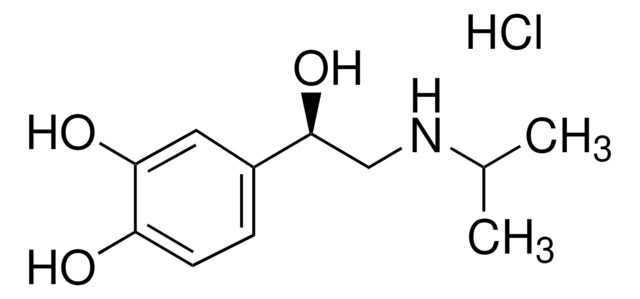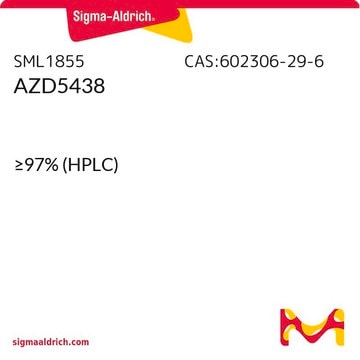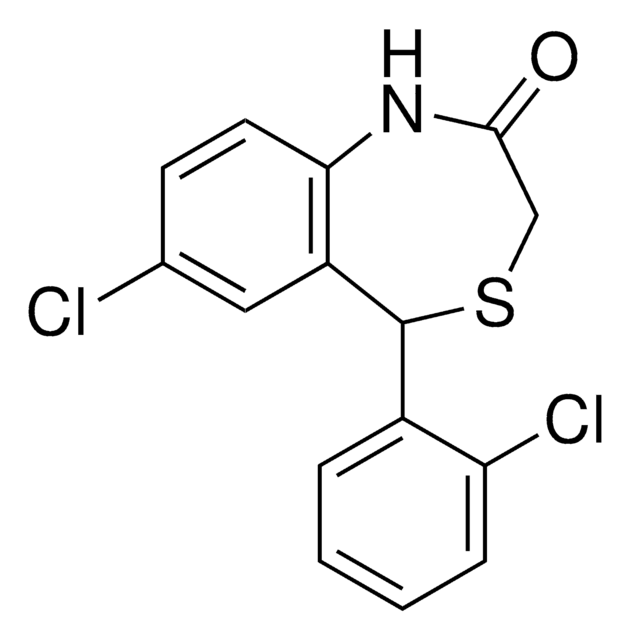M0199
Mdivi-1
≥98% (HPLC), powder, mitochondrial division DRP inhibitor
Synonyme(s) :
3-(2,4-Dichloro-5-methoxyphenyl)-2,3-dihydro-2-thioxo-4(1H)-quinazolinone, 3-(2,4-Dichloro-5-methoxyphenyl)-2-sulfanyl-4(3H)-quinazolinone
About This Item
Produits recommandés
product name
Mdivi-1, ≥98% (HPLC), powder
Pureté
≥98% (HPLC)
Forme
powder
Couleur
white to beige
Solubilité
DMSO: >20 mg/mL
Conditions d'expédition
wet ice
Température de stockage
−20°C
Chaîne SMILES
COc1cc(N2C(S)=Nc3ccccc3C2=O)c(Cl)cc1Cl
InChI
1S/C15H10Cl2N2O2S/c1-21-13-7-12(9(16)6-10(13)17)19-14(20)8-4-2-3-5-11(8)18-15(19)22/h2-7H,1H3,(H,18,22)
Clé InChI
NZJKEVWTYMOYOR-UHFFFAOYSA-N
Description générale
Application
- in embryonic thoracic aorta A7r5 cells to inhibit cell migration and proliferation
- in mitochondrial network reshaping and reactive oxygen species (ROS) production studies in oligodendrocyte precursor cells (OPCs)
- to induce mitochondrial damage in lung fibroblasts
Actions biochimiques/physiologiques
Caractéristiques et avantages
Code de la classe de stockage
11 - Combustible Solids
Classe de danger pour l'eau (WGK)
WGK 3
Point d'éclair (°F)
Not applicable
Point d'éclair (°C)
Not applicable
Certificats d'analyse (COA)
Recherchez un Certificats d'analyse (COA) en saisissant le numéro de lot du produit. Les numéros de lot figurent sur l'étiquette du produit après les mots "Lot" ou "Batch".
Déjà en possession de ce produit ?
Retrouvez la documentation relative aux produits que vous avez récemment achetés dans la Bibliothèque de documents.
Les clients ont également consulté
Articles
Cell cycle phases (G1, S, G2, M) regulate cell growth, DNA replication, and division in proliferating cells.
Cell cycle phases (G1, S, G2, M) regulate cell growth, DNA replication, and division in proliferating cells.
Cell cycle phases (G1, S, G2, M) regulate cell growth, DNA replication, and division in proliferating cells.
Cell cycle phases (G1, S, G2, M) regulate cell growth, DNA replication, and division in proliferating cells.
Notre équipe de scientifiques dispose d'une expérience dans tous les secteurs de la recherche, notamment en sciences de la vie, science des matériaux, synthèse chimique, chromatographie, analyse et dans de nombreux autres domaines..
Contacter notre Service technique















